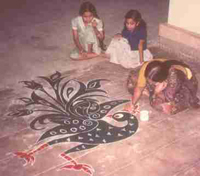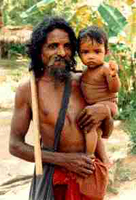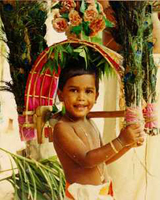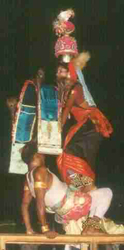 The Department of Folklore was started in 1987 with a view to undertake documentation and advanced research on the folk traditions of Asia. It started as a sequel to the Department of Manuscriptology which is engaged in the preservation and conservation of written documentary heritage. The main object of the Department of Folklore is the documentation, preservation and dissemination of folk traditions which are rapidly disintegrated owing to industrialisation, urbanisation and the advent of technological civilization including international mass media. The Department of Folklore was started in 1987 with a view to undertake documentation and advanced research on the folk traditions of Asia. It started as a sequel to the Department of Manuscriptology which is engaged in the preservation and conservation of written documentary heritage. The main object of the Department of Folklore is the documentation, preservation and dissemination of folk traditions which are rapidly disintegrated owing to industrialisation, urbanisation and the advent of technological civilization including international mass media.
Faculty
The faculty currently consists of the following members :
- Dr. C. Sivathanu, M.A., PhD
- Dr. Periyasamy, M.A., PhD
- Dr. Rozario Fernandez, M.A., PhD
Encyclopedia Projects The Department is engaged in the preparation of two comprehensive encyclopaedias, namely:
- Encyclopaedia of the Folk Culture of Karnataka; and
- Encyclopaedia of the Folk Culture of Tamil Nadu
 These encyclopaedias each in six volumes are being published in English with a view to make the rich folk culture of the Tamil- and Kannada-speaking communities accessible to international scholarship. The first volume of the Encyclopaedia of the Folk Culture of Karnataka has already been published in 1995 and the second volume is in progress. The first volume of the Encyclopaedia of the Folk Culture of Tamil Nadu is in print and it will be released in mid-2000. These encyclopaedias each in six volumes are being published in English with a view to make the rich folk culture of the Tamil- and Kannada-speaking communities accessible to international scholarship. The first volume of the Encyclopaedia of the Folk Culture of Karnataka has already been published in 1995 and the second volume is in progress. The first volume of the Encyclopaedia of the Folk Culture of Tamil Nadu is in print and it will be released in mid-2000.
Documentation Projects
The Department of Folklore is engaged in projects which aim at documentation of the multifarious facets of the folk culture of Tamil Nadu in a detailed and systematic way. We plan to undertake a detailed district-by-district survey of the folk culture of all the 29 districts of Tamil Nadu and publish in 29 volumes along with video and audio cassettes to supplement the text. The first volume of this series covering the folk culture of the southern-most district of Tamil Nadu, Kanyakumari district, has already been completed. This work will accelerate and it is expected to be completed within ten years.
Tribal lore
The Department is also engaged in survey projects pertaining to the hill tribes of Tamil Nadu, excluding the tribes of the Nilgiri Mountains. This work is in progress; the final report will be issued in late 1999.
Relationship between Ecology and Folklore
 The Department has made a pilot study on the interaction between ecology and folklore with special reference to the fishing community of Kanyakumari district in the fishing hamlet of Pudur consisting of 500 families living on the coast of the Arabian Sea near Colachal. This survey has been undertaken successfully and its report will be published later this year. Following this sample project the Institute has expanded the same theme to the hill tribes of Tamil Nadu as well as its fishing communities. The Department has made a pilot study on the interaction between ecology and folklore with special reference to the fishing community of Kanyakumari district in the fishing hamlet of Pudur consisting of 500 families living on the coast of the Arabian Sea near Colachal. This survey has been undertaken successfully and its report will be published later this year. Following this sample project the Institute has expanded the same theme to the hill tribes of Tamil Nadu as well as its fishing communities.
Folk Ballads
Another project which is nearing completion is a three-volume series on the Folk Ballads of Tamil Nadu. The first volume consist of Tamil social ballads with their English translation, while the second and third volumes deal with historical and mythical ballads.
Publications
 The folklore of Tamil Nadu exists not only as oral traditions but also in palm-leaf manuscripts. Performing artists of folk genres like villu pattu, kaniyan koothu, udukai pattu, theru koothu etc., have recorded their folk ballads in palm-leaf manuscripts which serve as guide books during performance. The Institute has collected a large number of folk ballads available both in oral traditions as well as in palm-leaf manuscripts and published them with English translation. These include: The folklore of Tamil Nadu exists not only as oral traditions but also in palm-leaf manuscripts. Performing artists of folk genres like villu pattu, kaniyan koothu, udukai pattu, theru koothu etc., have recorded their folk ballads in palm-leaf manuscripts which serve as guide books during performance. The Institute has collected a large number of folk ballads available both in oral traditions as well as in palm-leaf manuscripts and published them with English translation. These include:
- The Elder Brother Story (Ananmar Katai) in two volumes is a popular Tamil folk ballad in the Kongu region of Tamil Nadu. It tells the colourful story of the prowess, valour and heroic qualities of triplets: elder brothers and their sister. This has been collected from the oral traditions and translated into English by the leading Indologist Brenda B.F. Beck.
- The Bandit Brothers (The Story of Cantanattevan) story of Cantanattevan popular in the Ramnad and Madurai districts. Collected by O. Muthiah and translated by G.S. Balakrishnan. Acrobats
- The First Freedom Fighter (The Story of Pulittevan) dealing with first freedom fighter, Pulittevan
- The Wandering Voice (Three Ballads from Palm-leaf Manuscripts) the first volume of our Folklore of Tamil Nadu series and Best Book of the Year (Translation)award winner. Translated by Dr. V. Murugan.
- The Dateless Muse(The Story of Venkalarajan) a socio-historical folk ballad printed from an unpblished palm-leaf manuscript along with critical introduction and translation in English verse.
- The Divine Pilgrimage (Perumal Cami Katai) is a glowing account of an imagined pilgrimage by Lord Visnu of Srirangam to Tiruvanantapuram, with lively descriptions of places and imaginative mythological allusions which inspire the reader with English translation. Translated by Dr. J. Parthasarathi.
- The Tale of Romance(Sakuntalai Natakam) is a nativized folk version of the story of Shakuntala from palm-leaf manuscripts collected from Kanya Kumari district, presenting the Shakuntala-Dushyanta episode of the Mahabharata in simple Tamil verse within the social milieu of Tamil Nadu. Translated by V. Gowri Shankar.
- Our survey on folk traditions shows that the famous dramatic form yatcakanam popular in Andhra Pradesh and Karnataka was prevalent in Tamil Nadu also. We are able to identify seven yatcakanam. We have published with English translation four yatcakanam dealing with the story of Nili (A Tale of Nemesis) and another dealing with the story of two women warriors (The Valorous Virgins). Our publication entitled A Tale of Betrayal deals with the story of Carankataran whereas our title Where Justice Chimes deals with the story of Manu presented in the yatcakanam form. We have also brought out a folk version of the Ramayana story in two volumes under the title The Epic Eternal. Another folk story dealing with the story of one of the Catholic saints. Margarett in the genre ammanai has been published as The Defender of Faith. We have also brought out some ballads under the names Destiny and Divinity and The Vows Fulfilled.
International Conference Seminar Series on Skanda-Murukan
The Institute organised and hosted a major international conference on the cult of Skanda-Murukan in December, 1998. This seminar examined the various aspects of this cult including principally its evolution in the folk tradition from pre-historic times to the present. More than 135 scholars representing 23 countries submitted papers, including at least three IAS scholars and several others affiliated with this Institute. The Website for the Second Murukan Conference is publishing the Conference papers as a comprehensive research volume about folk and literary traditions of this very popular and intriguing Indian deity. |
